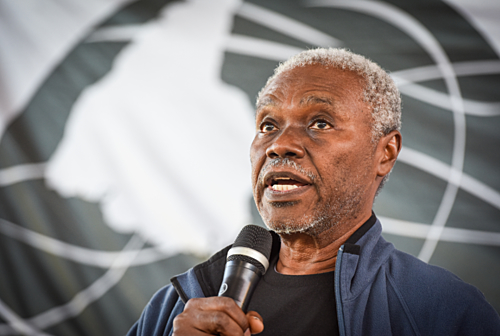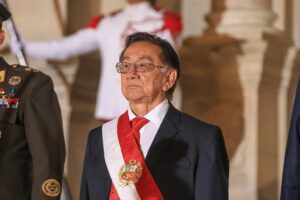
Haiti was once self-sufficient in cereals. In the early 1970s, it produced practically 100% of what it needed. Five decades later, the country buys 82% of the rice its population consumes from the United States. The cause is the structural adjustment policies imposed on the country, which stimulate imports and prevent the State from financing the peasant economy. Among the consequences is unemployment, which today affects 70% of the population.
The assessment is from Haitian Camille Chalmers, leader of the Rasin Kan Pèp la party (socialist regrouping for a new national initiative). According to him, Haiti is the victim of “chaos orchestrated by imperialist organizations”, which want to continue executing their commercial interests. To do this, they need to prevent the Haitian people from achieving self-determination and choosing their own path of development.
Because of this, Chalmers is against any and all international interventions in Haiti, such as the one approved this week by the United Nations Security Council. “We have already undergone several interventions. Every time you do this, the situation gets worse,” he says. “The current situation is the result of an imperialist intervention”, he adds, referring to the peace mission led by Brazil from 2004 to 2017.
The political leader, who spoke to the Brazil in fact via videoconference from Port-au-Prince, cites a list of economic activities in which this logic manifests itself. “From the beginning of the 20th century, imperialism invested to structure the sugar industry in Cuba and the Dominican Republic, and assigned Haiti the task of providing cheap labor for these industries. To maintain this, it is important that employment conditions and social standards are terrible.” He also mentions that Haiti is strategic due to the existence of essential resources for transnational companies, such as the gold that would be found in the northern region of the country.
:: Brazil’s role in Haiti must be police training; sending troops is not on the horizon ::
“Many say that Haiti is rich in precious metals, but none of this has been proven to date. It is a gray area, which is part of an ideological discourse”, ponders professor Ricardo Seitenfus, doctor in International Relations, former OAS representative in Haiti (2009-2011) and author of books about the country.
As for the drop in rice production, there was in fact encouragement from the United States for Haiti to reduce tariffs and thus encourage the import of rice produced in the state of Arkansas — former president Bill Clinton (1993-2001) even made a move blame this publicly, recognizing how harmful it was for Haiti. This preference for imports, by reducing job opportunities in the countryside, led to migration to the cities, which ended up becoming “a bomb, with slums everywhere”, says Seitenfus. “However, nothing was done [pelo Haiti] since then to stop it.”
In addition to the very high level of unemployment, Haiti has been experiencing a bitter economic recession for five consecutive years, 50% annual inflation and a population with very low purchasing power, data that illustrate the scenario of a serious crisis experienced by the country, whose clearest and most media element at the moment It’s rampant violence. Haiti is experiencing a collapse of institutions and a large part of the capital is under gang control. At least 2,000 homicides and 1,000 kidnappings were recorded in the first half of 2023 alone, according to UN estimates.
Another example of how the United States government contributes to this scenario, in Camille Chalmers’ view, is the fact that Washington has done “everything possible to combat” PetroCaribe, an oil sales program created by Hugo Chávez when he was president of Venezuela. (1999-2013) and which supplied raw materials to 16 countries under “exceptional” financial conditions.
Here, again, Seitenfus validates the historical argument, but with another caveat that places part of the responsibility in the lap of Haitians. “It is true that the US tried to prevent [a concretização do PetroCaribe]. There are documents that show this resistance. But the problem is that 3 billion dollars were diverted”, says the professor. “One day this will have to be agreed with Venezuela.”
:: Crisis in Haiti has fingerprints of Bolsonarist generals; find out which ministers served in the country ::
Washington’s failures
The USA, in Seitenfus’s assessment, has two major failures in terms of foreign policy in the Caribbean: Cuba and Haiti. The first, because of the Cuban Revolution, which continues despite the embargo imposed by Washington. The second “pays the price for being close to Cuba,” he says. Jean-Claude Duvalier, ‘Baby Doc’, who commanded Haiti from 1971 to 1986, was a dictator, but a dictator accepted by the USA because “a second Cuba could not be accepted in the Caribbean”. And thus, “we closed our eyes to Haiti’s problems.”
Camille Chalmers says the US wants to maintain control over Haitian politics because it fears a possible alliance between Cuba, Venezuela and Haiti, “which would produce a change in the balance of forces in the Caribbean”. As examples of how such an alliance could be configured, he mentions the aforementioned PetroCaribe, which the Venezuelan government showed interest in reactivating last year, and the work of Cuban doctors in remote areas of Haiti, which reduced indicators of maternal mortality and represents a example of what “true solidarity with Haiti” could be.
:: Brazilian government must develop ‘new cooperation’ with Haiti, says Haitian leadership ::
But this does not work, according to him, because in addition to international pressure, there is the complicity of managers who, he considers, are appointed by international missions, without participation from society. This would be the case of the current government of Prime Minister Ariel Henry, who took office after the murder of Jovenel Möise, in 2021.
“The entire current political administration in Haiti must be considered illegal from a constitutional point of view”, emphasizes Ricardo Seitenfus. This is because, although the Constitution establishes that, in the event of the president’s death, the prime minister must exercise power until a new ruler is elected, Henry was never sworn in nor approved by Parliament.
However, he says, if there is anyone with a minimum of legitimacy to govern Haiti, “this is Ariel Henry, as he was chosen for the position of prime minister by the assassinated president”. And he, in turn, had been democratically elected.
Editing: Leandro Melito

Source: www.brasildefato.com.br

